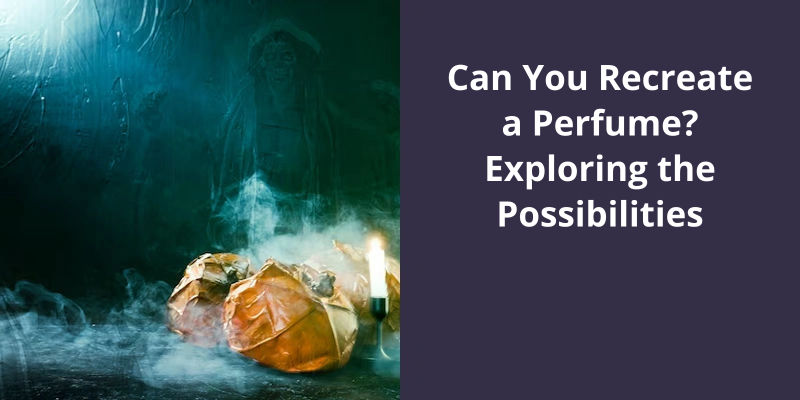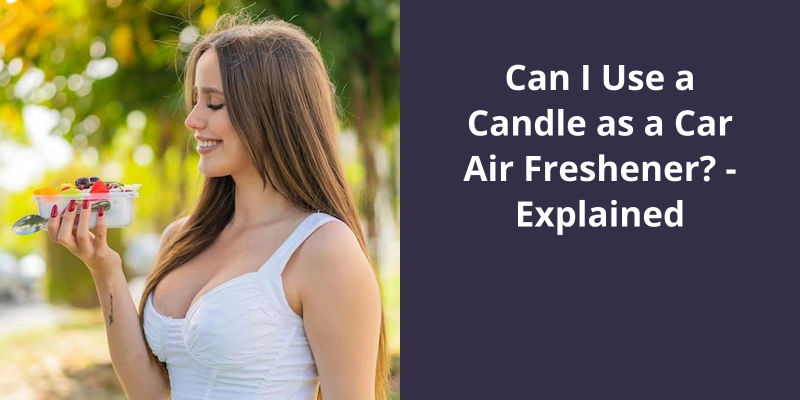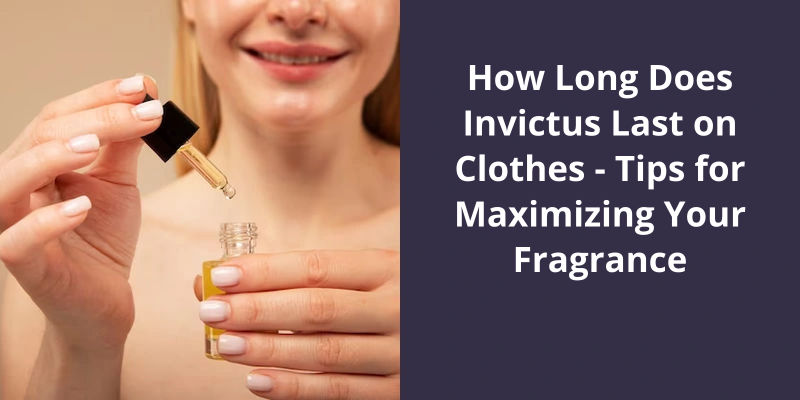The art and science of perfumery have been around for centuries, captivating our senses and emotions through the power of scent. A well-crafted perfume is a work of art, unique and evocative, but what happens when you fall in love with a scent that’s no longer available? Can someone recreate a perfume from scratch? With the help of modern technology and expert perfumers, the answer is yes. Analysing a formula to recreate it begins with deconstructing the original scent into it’s individual components through the use of a chromatography machine. This highly sophisticated process separates out the various compounds in the perfume, allowing an expert nose to analyse and recreate the formula with the help of advanced software tools. The result is a stunning and identical replica of the original scent, bringing back to life a beloved fragrance that was once thought lost forever.

Can You Make a Perfume of Someone?
Personalized perfume is a unique way to show someone how much you care about them. It’s a gift that not only smells great but also has a personal touch. Making a perfume of someone is a creative process that requires a lot of thought and effort. Choosing the right scent and adding special personal touches can make the perfume truly unique.
The first step in creating a personalized perfume is to choose the right scent. This involves considering the persons personality, likes, and dislikes. For example, if they enjoy the scent of flowers, then floral notes would be a great choice. If they prefer a warm and cozy scent, then vanilla or musk might be better. It’s important to take the time to consider their preferences and find the right scent that will complement them.
Once youve chosen the scent, you can start adding personal touches. This can be anything from writing their name or a special message on the bottle to adding a few drops of their favorite essential oil. You can also incorporate other meaningful elements, such as the scent of a favorite place or memory.
This may involve testing and adjusting the scent to ensure it’s just right. You may also want to work with a professional perfumer to help guide you through the process.
It requires a lot of thought and effort, but the end result is a truly personalized and unique scent that they’ll cherish for years to come.
What Are the Benefits of Using Personalized Perfume?
Personalized perfumes are scents that are customized to suit your preferences and personality. They offer a range of benefits, including creating a unique scent that’s distinct to you, boosting your confidence and mood, and making a great impression on others. Personalized perfumes also offer a longer-lasting fragrance and eliminate the need for repetitive scent applications throughout the day.
While commercial fragrances can cost a pretty penny, there’s an option that allows you to have your own personalized scent without breaking the bank. Custom perfumes have become increasingly popular for those who want a unique fragrance that reflects their individual style and personality. But just how much does it cost to have a custom perfume made? Let’s explore the options.
How Much Does It Cost to Have a Custom Perfume Made?
Aside from the actual cost of the ingredients, there are other factors that can affect the price of a custom perfume. One of these is the expertise of the perfumer creating the fragrance. A more experienced perfumer may charge more for their services, but they’re also more likely to produce a high-quality scent that reflects the customer’s preferences and personality.
The price of the bottle and other packaging materials can add up quickly, especially if the customer wants a unique or elaborate design. However, some perfumers may offer more budget-friendly options for packaging, such as simpler bottles or even sample sizes.
When it comes to creating a custom perfume, it’s important to keep in mind that the process can take some time. The perfumer will likely need to meet with the customer to discuss their preferences and create a custom blend of oils or other fragrances. This can be a time-consuming process, but it’s important for ensuring that the final product is exactly what the customer wants.
However, even with these costs factored in, many people find that a custom fragrance is well worth the investment, as it allows them to express their unique style and personality in a way that’s truly one-of-a-kind. So if you’re looking to create a signature scent that truly reflects who you are, a custom perfume may be just what you need.
So, while there’s no law against recreating a perfume, there are ethical and moral considerations to take into account. Some argue that it’s unfair to copy someone else’s hard work without giving them credit or compensation. Others believe that recreating a perfume can be a form of flattery and a way to create an homage to a beloved scent. Regardless of where you stand, it’s important to understand the legal and ethical implications before attempting to recreate a perfume.
Is It Legal to Recreate Perfume?
When it comes to recreating perfume, many people wonder about the legality of it. After all, perfumes are created using intricate blends of scents and fragrances, which are often carefully guarded secrets by the perfumers who create them.
One of the main reasons for this is that the formulae of perfumes can’t be patented. This means that the complex blends of scents and fragrances that make up a perfume can’t be protected against plagiarism. This may seem like a potential issue for perfumers who’re concerned about their creations being copied, but luckily, the cosmetic regulation provides some level of protection.
In fact, the cosmetic regulation allows perfumers to keep their perfume formulae secret simply by not disclosing the ingredients that compose the “fragrance.”. This allows perfumers to protect their creations from being copied by others, while still allowing others to recreate the scents if they wish.
For example, if someone were to recreate a particular perfume and sell it under the same name or branding, they could potentially face legal issues for infringing on the trademark of the original product. However, as long as they were careful not to use any copyrighted branding or trademarks, they’d be within their legal rights to create and sell their own version of the perfume.
As long as these considerations are taken into account, anyone can create their own version of their favorite fragrance without worrying about legal issues.
What Are Some Common DIY Methods for Recreating Perfumes?
- Using essential oils to create your own unique scent blends
- Mixing together different fragrance oils to create a custom scent
- Replicating a favorite perfume by breaking down it’s scent notes and recreating them with individual oils
- Experimenting with different combinations of citrus, floral, woody, and spicy scents to find a combination that works for you
- Creating a perfume spray by combining distilled water, vodka, and your preferred essential or fragrance oils
- Using natural ingredients like vanilla beans, cinnamon sticks, and other spices to add depth and complexity to your perfume creations
- Researching and experimenting with different perfume making techniques, such as blending, maceration, and enfleurage
Perfume is an essential personal accessory for many people. Whether it’s for a special occasion or everyday wear, the right scent can make all the difference. But what happens when our favorite perfume runs out or is discontinued? Is it possible to duplicate the scent? While it may not be an exact replica, it’s possible to create a similar fragrance. However, there are some things to keep in mind when attempting to duplicate a perfume. One of the biggest differences is the strength of the fragrance, as fragrance oils have a higher concentration and lack the alcoholic content of the original scent.
Can You Duplicate Perfume?
Perfume duplication is a controversial topic which has received mixed reactions from perfume users and creators. The fundamental question remains whether it’s possible to precisely replicate an original perfume. The answer to this question is both yes and no. The yes side argues that advances in technology and the availability of fragrance components make it possible to create similar smells. The no side argues that duplicating perfume is impossible due to the complex nature of fragrances, which may not always be fully understood or documented.
There are different ways to duplicate perfume, and each method has it’s advantages and disadvantages. One method involves analyzing the original perfume and breaking down it’s notes to determine the ingredients used. This involves conducting a chemical analysis of the fragrances top, middle, and base notes, which helps to identify each ingredients specific role in the scent. Once this is determined, a perfumer can select the same or similar ingredients to create a similar scent.
Another method is to use a fragrance library, where fundamental scents are stored and combined to create a new fragrance. In this case, the perfumer uses the existing scents to recreate the fragrance as closely as possible. Since the ingredients stored in the fragrance library are of good quality, they can be blended to create a scent that replicates the original.
Despite the various methods used to duplicate fragrances, it isn’t always possible to get an exact match. This is because natural and synthetic ingredients may vary in quality, concentration, or processing, making it difficult to recreate the exact scent. In addition, the age and storage conditions of the original fragrance will impact it’s quality and longevity, and it isn’t always possible to replicate these conditions.
The Legal Implications of Perfume Duplication, Including Trademark Infringement and Intellectual Property Rights
This topic explores the legal consequences that may arise when a perfume brand duplicates another brand’s fragrance without permission, such as trademark infringement and violation of intellectual property rights. These legal issues aim to protect the original brand’s naming and commercial rights, preventing others from profiting from their innovation and creativity.
Now that we know the benefits of using natural fragrances over synthetic alternatives, it’s time to explore the possibility of making your own perfume. With the right combination of exotic oils and carrier oil, you can create a unique and long-lasting fragrance that truly represents your personal scent. In this article, we’ll dive into the steps and ingredients needed to create your very own homemade perfume.
Can You Make a Perfume of Your Own Scent?
The unique scent that emanates from every individual is a result of their bodys chemistry and composition. It’s what sets them apart from others in terms of smell. Humans have been using perfumes for centuries to accentuate their natural odor. While synthetic perfumes have gained popularity in recent times, natural fragrances from essential oils last longer and are considered superior. If youre someone who pays attention to their personal scent and wants to make a perfume of your own scent, then youre in luck.
Making perfumes is a fun and creative way to explore your olfactory preferences. It can be a challenging task, but the end result is worth the effort. The secret to creating the perfect perfume is to experiment and find the right fragrance combination that corresponds to your natural scent. You can start by exploring the world of exotic oils such as patchouli, rose, sandalwood, vanilla, ylang-ylang, and orange. These oils are known for their long-lasting and sweet scent and can be found online or in specialty stores.
Once you’ve collected your desired oil, you can start blending them into a perfume. The first step is to select a carrier oil, which will act as a base for the fragrance. Jojoba oil is the best oil to use when making perfume for it’s light texture and lack of scent. Mix four teaspoons of jojoba oil with 25 drops of your chosen essential oils in a clean glass container. You can experiment with different ratios of essential oils until you achieve your desired scent.
The next step is to let your perfume mature so that it can blend well. Place the bottle in a cool, dark place for at least 48 hours. During this time, the fragrance molecules will continue to merge and develop, and the scent will deepen. After 48 hours, you can test your perfume by applying a few drops to your wrist. If youre satisfied with the scent, you can store it in a spray bottle or a rollerball for easy application.
It’s a great way to personalize your fragrance and express your personality. With a little experimentation and patience, you can create a unique scent that represents your individuality. So, why not try making your perfume today? You might just discover your signature scent.
The Benefits of Using Natural Perfumes Versus Synthetic Ones
- Natural perfumes are made from natural ingredients, which means they’re free from harmful chemicals and toxins.
- They don’t cause skin irritations, headaches or other allergic reactions.
- Natural perfumes are eco-friendly and don’t harm the environment.
- They’ve authentic scents that don’t overpower the senses or cause respiratory problems.
- They’re long-lasting and give a subtle fragrance throughout the day.
- Using natural perfumes promotes a healthier and more natural lifestyle.
Source: Homemade Perfume: How to Make Your Own Perfume
Creating a bespoke fragrance is the ultimate luxury for those seeking a truly unique scent. But how much does it actually cost to have a perfume created just for you? The answer might surprise you, as bespoke fragrances can cost upwards of $50,000 depending on the ingredients and expertise needed. In this article, we’ll explore the world of bespoke perfumes and how they’re made, with insights from industry expert Pia Velasco, a seasoned beauty reporter with over a decade of experience in the field.
How Much Does Bespoke Perfume Cost?
Bespoke fragrances are the ultimate luxury for those who want a truly unique scent. These perfumes are made from scratch and customized to fit the individual needs of the customer. The process begins with a consultation with a professional perfumer to discuss the customers preferences and desires. The perfumer then creates a fragrance that’s tailored to the customers specific needs.
The cost of bespoke perfume can vary greatly depending on a number of factors. One of the biggest factors is the materials used to create the fragrance. Some materials, such as rare flowers and exotic spices, can be quite expensive. The cost of these materials can drive up the price of a bespoke fragrance significantly.
The process of creating a bespoke fragrance can take weeks or even months of careful crafting and refining. Perfumers must carefully balance and blend different scents to create a fragrance that not only smells beautiful but also lasts for a long time.
This high price point is due to the exclusivity and craftsmanship that goes into creating each fragrance. Each fragrance is unique and can’t be replicated, making it a truly one-of-a-kind luxury item.
Many people are willing to pay a premium for a product that’s tailored specifically to their tastes and preferences.
While they can cost a small fortune, the exclusivity and craftsmanship that goes into each fragrance make it a truly one-of-a-kind item.
Conclusion
In conclusion, the art of perfume-making is a delicate balance between science and artistry. While the formula for a perfume may be complex, the ability to recreate it isn’t impossible. The use of chromatography machines and expert noses, combined with advanced software analysis, allow for the recreation of a perfume in a way that preserves it’s unique scent and character. With the right knowledge and tools, it’s possible to recreate a beloved fragrance and bring it back to life.





